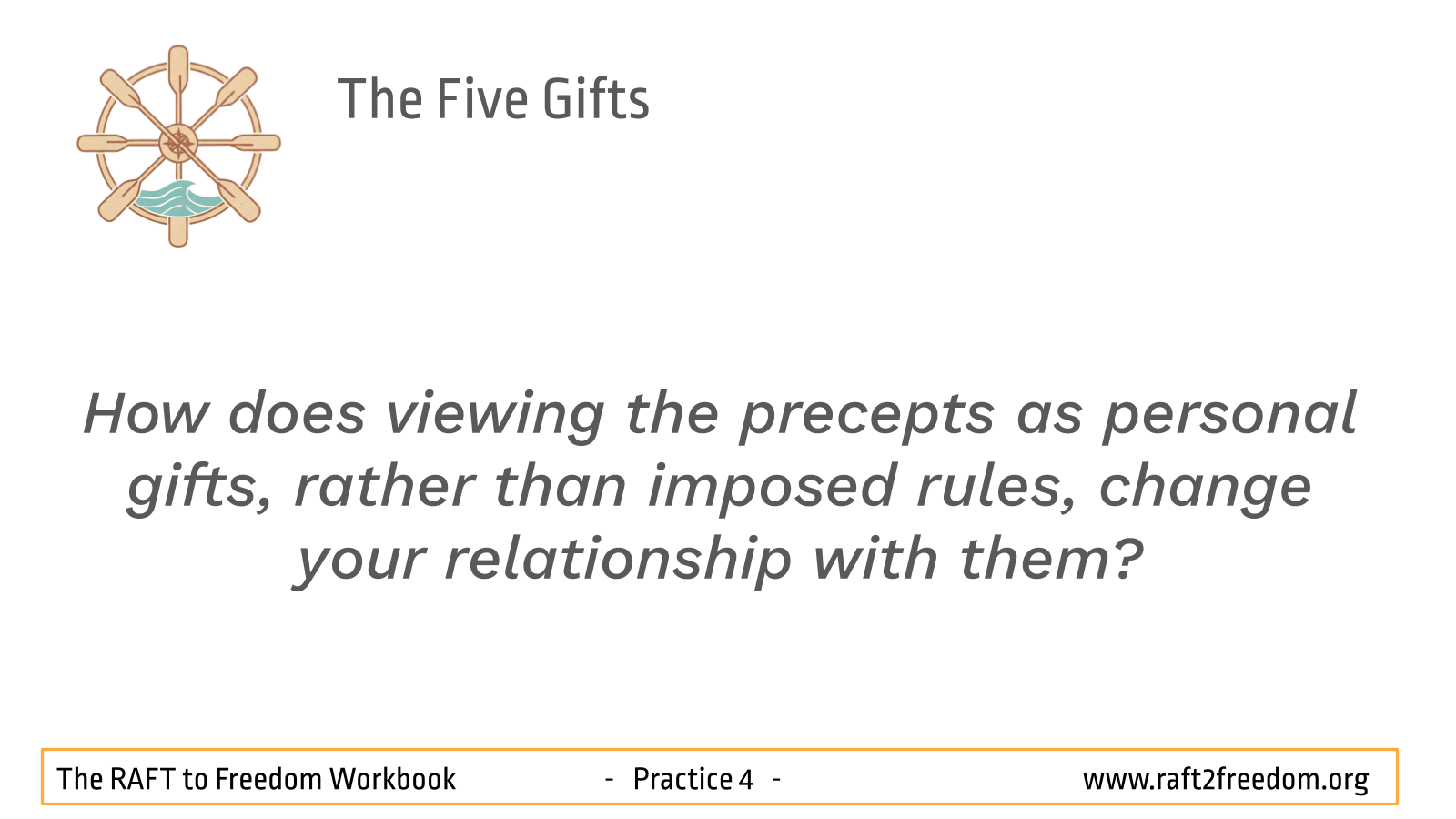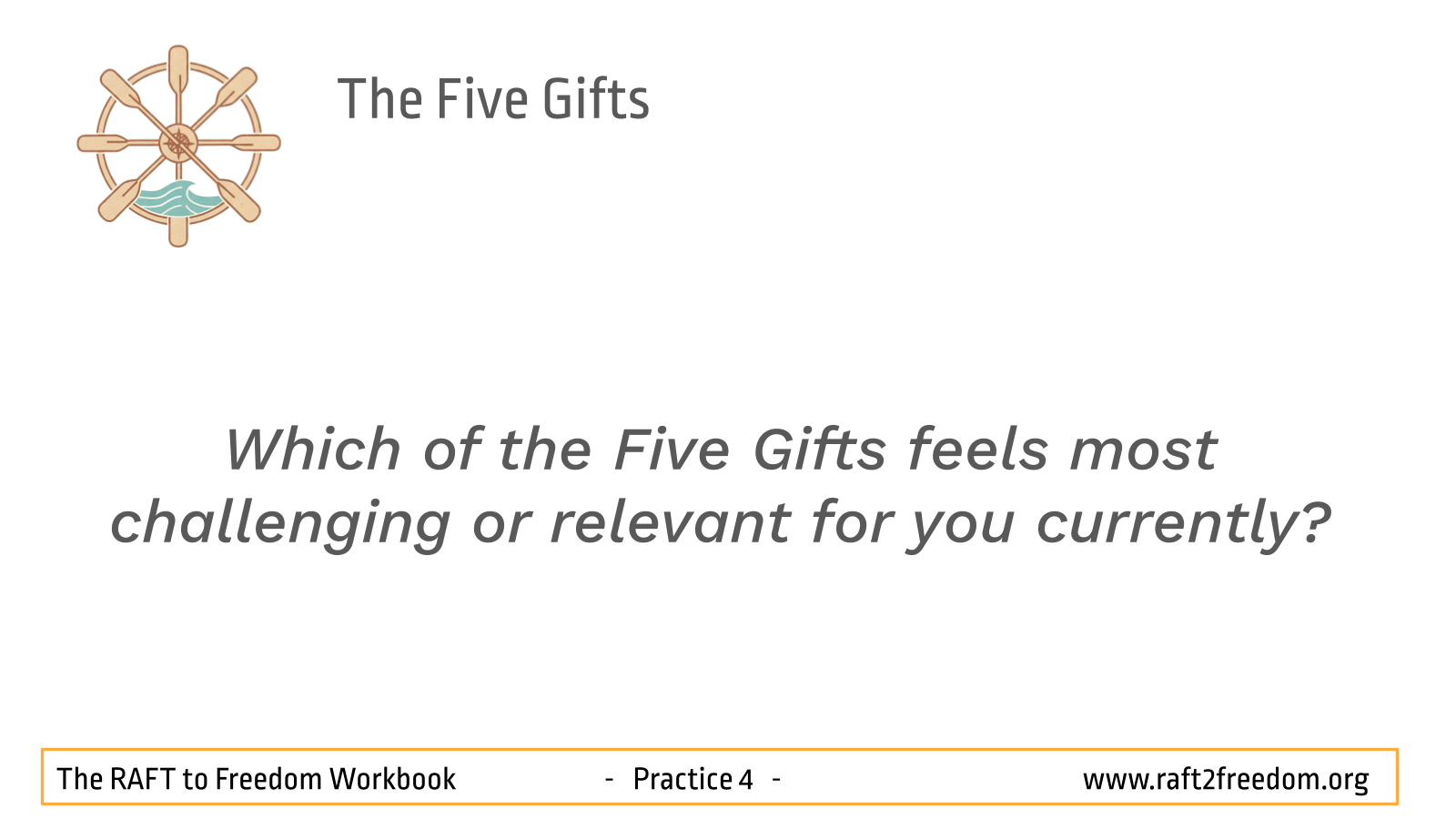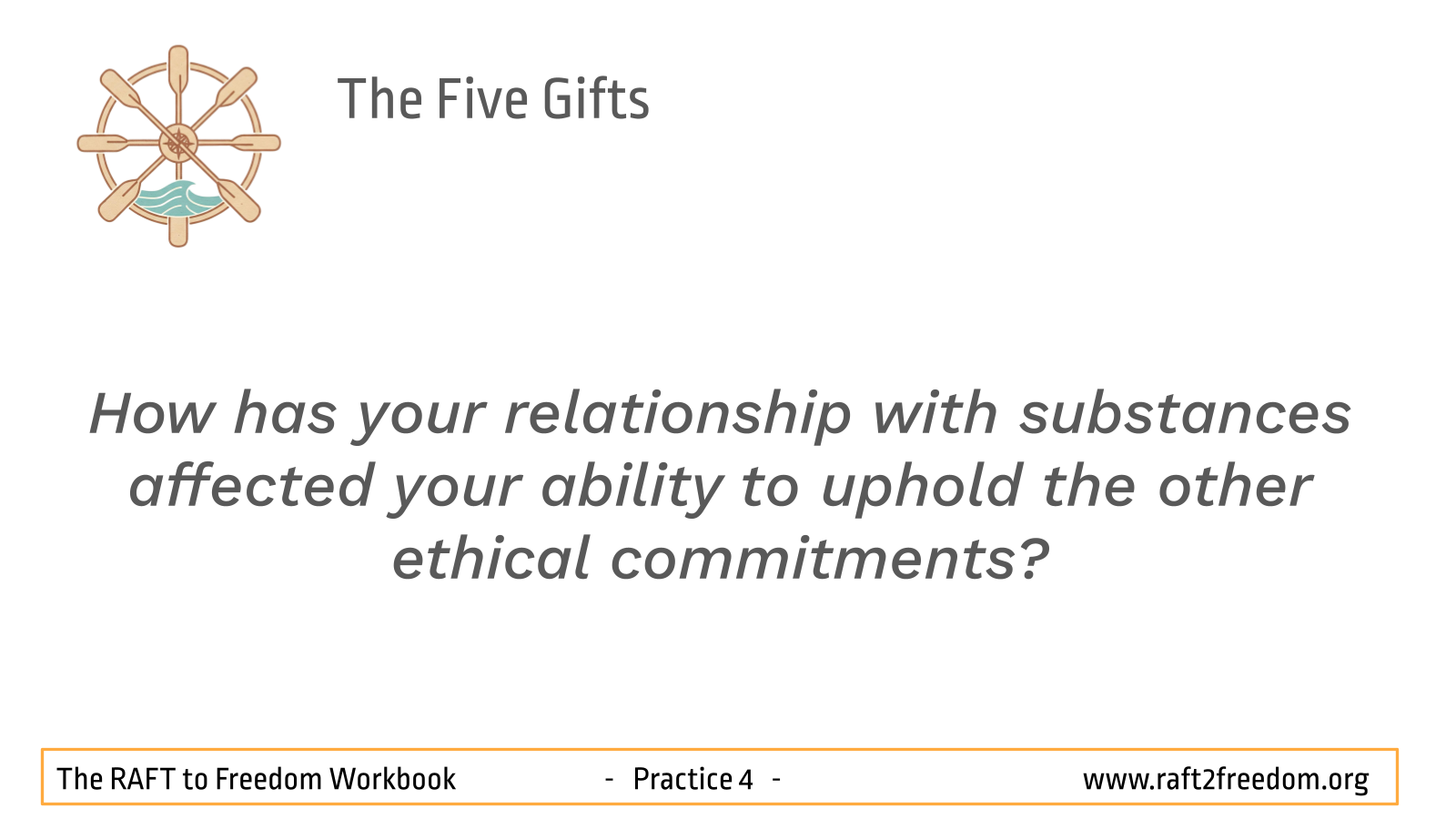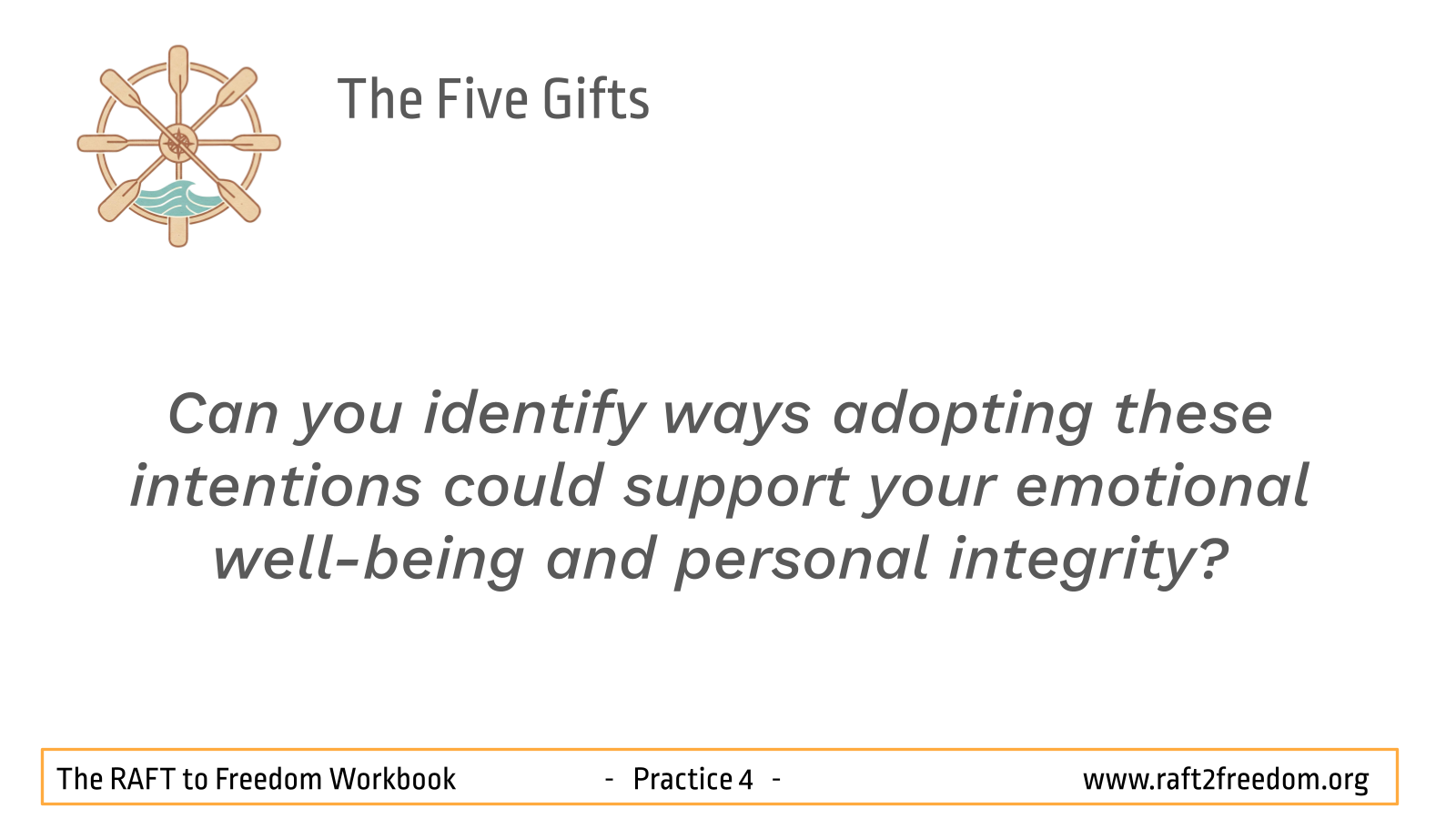Commitment to harmlessness – the gifts of the five precepts
The foundational planks of our raft: laying a groundwork of kindness

Episode 4 – The Foundational Planks of Our Raft: Commitment to harmlessness
An AI generated ‘deep dive’ into this aspect of the RAFT to Freedom
RAFT to RecoveryRecovery is not just about stopping the destructive behaviour. It’s about cultivating a life worth living
Gabor Mate
Setting off on the first stage of our journey from suffering to freedom, we begin by laying an essential solid foundation to our raft. Before delving deeply into the complexities of our human suffering and the specifics of our compulsions and destructive patterns of behaviour, it’s incredibly helpful for us to establish a baseline commitment to harmlessness. This commitment, embodied in what Buddhism calls the ‘Five Precepts’, is not about imposing rigid rules, but about cultivating awareness of how our actions impact ourselves and others – consciously choosing to minimize harm. This ethical awareness forms the very foundation of our RAFT to Freedom. In many ways, these five precepts can be considered an original harm reduction programme.
If the foundational planks of our raft – the base upon which everything else rests – are weak and rotten, then no matter how skillfully we gather other materials like mindfulness or wisdom, our vessel will leak and not be seaworthy. Committing to harmlessness, through the spirit of Gotama’s five precepts, ensures that we are building a watertight raft.
Universal guidelines for harmony: ancient wisdom
Gotama’s five precepts as guidelines for ethical living are not exclusively Buddhist but reflect a timeless, universal understanding of how humans could live together more peacefully. Long before Gotama was born, early legal codes addressed common themes that societies still grapple with today: violence, theft, sexual impropriety, untruthfulness, and the disruption caused by intoxication. The ‘Ur-Nammu Code from Mesopotamia’ (around 2100 BCE) predates Gotama by 1,500 years and already punished homicide, bodily injury, theft, robbery, adultery, and perjury. The later ‘Hammurabi Code’ (c. 1750 BCE) added concerns about public order.
These ancient codes aimed to establish frameworks to prevent disputes and conflicts. They recognised that certain actions reliably cause harm and undermine social stability. So, when Gotama suggested the five precepts, he wasn’t creating an entirely new concept, he was tapping into an ancient and traditional understanding of what had helped to promote social order and reduce suffering.
Beyond law: the five great gifts
Gotama, however, framed these guidelines very differently from established legal codes of the time. Laws had typically focused on external rules, obligations, and punishments but Gotama presented the five precepts as profound, personal gifts. Around 2,600 years ago, he spoke of:
These five gifts – original, long-standing, traditional, ancient, unadulterated, unadulterated from the beginning – that are not open to suspicion, will never be open to suspicion, and are un-faulted by knowledgeable contemplatives & brahmans.
Why did Gotama describe these precepts as gifts? Because when we sincerely undertake these precepts, we are offering the gifts of fearlessness and harmlessness unconditionally to all beings, including ourselves. We are essentially saying that regarding these five fundamental areas where harm is often caused – “you have nothing to fear from me!’ It’s our commitment to acting with awareness and care which fosters trust, safety, and connection – essential elements that have often been damaged by our destructive compulsions and behaviours. They are crucial for healing and when we offer these gifts, it is an act of profound kindness and generosity.
Personal intentions, not commandments
Crucially, these five precepts are best understood as training guidelines or personal intentions, not as rigid commandments demanding impossible perfection. The path from suffering to freedom is one of learning and growth, and we are all imperfect human beings, therefore, we frame these precepts using conscious intention:
- “I set the intention not to harm myself or others by my thoughts, by my words or by my actions.”
- “I set the intention not to take anything that has not been freely given.”
- “I set the intention not to harm myself or others by my sexual and sensual misconduct.”
- “I set the intention not to harm myself or others by false speech, harsh speech, gossip and slander.”
- “I set the intention to refrain from taking alcohol and other drugs that impair my mindfulness.”
This framing acknowledges that we are setting a caring and ethical course, we are cultivating an aspiration of harmlessness. We focus on positive intention rather than on prohibition. When we inevitably fall short (as all humans do), this framing encourages us to have self-compassion and renew our commitment, rather than experience the shame and self-condemnation that can trigger us to spiral into our old harmful patterns when rigid rules are broken – falling overboard.
Let’s look briefly at each intention:
- Harmlessness: Committing to refrain from killing or intentionally causing physical or deep emotional harm. This is the bedrock of ethical conduct.
- Trustworthiness: Committing to refrain from taking what isn’t ours, respecting others’ property and boundaries. This builds integrity.
- Sexual Responsibility: Committing to refrain from sexual actions that cause harm to ourselves or others (for example, exploitation, adultery, actions breaking trust). This fosters respect and care in relationships.
- Truthfulness and kind speech: Committing to refrain from lying, harsh words, divisive gossip, and slander. This promotes clear communication and connection.
- Clarity of mind: Committing to refrain from consuming intoxicants, examples may include alcohol and other drugs that have not been specifically prescribed by a doctor to the point of carelessness or loss of mindfulness. This precept is especially crucial in our recovery journey, no matter what our most destructive compulsive behaviour has been. Intoxication directly clouds our awareness, which we need to uphold the other precepts and engage skillfully with the challenges of life. It undermines our ability to navigate our raft effectively.
Kindness and reducing the need for forgiveness
By setting these intentions, we are proactively reducing the amount of harm we cause, thereby lessening the future need for us to grapple with guilt and self-forgiveness and the need to seek forgiveness from others. These categories of harm (violence, betrayal, dishonesty and so forth) are so universal, they also form the basis for other practices like forgiveness meditation. Committing to the precepts is preventive medicine for the heart and relationships. It is a fundamental way through which we practice kindness – offering safety to others and fostering self-respect within ourselves.
Self-Reflections
Take a few moments for honest self-inquiry:
- How does viewing the precepts as personal gifts, rather than imposed rules, change your relationship with them?
- Which of the Five Gifts feels most challenging or relevant for you currently?
- How has your relationship with substances affected your ability to uphold the other ethical commitments?
- Can you identify ways adopting these intentions could support your emotional well-being and personal integrity?
Journaling prompts
Use your journal to explore these themes further:
- Reflecting on intentions: Choose one intention that resonates strongly or poses challenges. Observe how you navigate related situations and journal about your experiences, challenges, and insights.
- The gift of safety: Reflect on how living with harmlessness might reduce fear, anxiety, and conflict in your life and relationships.
- Historical harm, present intention: Identify a past action causing harm aligned with one of the precepts. Without dwelling on guilt, reflect on how adopting the intention now might lead to different outcomes.
- Clarity and ethics: Explore the direct connection between clarity of mind (avoiding intoxicants) and your ability to act ethically in daily situations.
Supporting material: ancient wisdom and modern relevance
For those interested in the science and philosophy behind this practice, here is a brief overview:
- Psychology: Modern psychology validates the importance of ethical conduct for mental health. Living in accordance with our values reduces cognitive dissonance, guilt, and shame, while increasing self-esteem and self-respect. Prosocial behaviour (acting for others’ benefit, including non-harming) is linked to greater happiness and stronger social connections. In recovery from addiction and other harmful compulsive behaviours, rebuilding integrity and trustworthiness, is a key psychological task directly supported by committing to the precepts. Addiction often impairs impulse control; the precepts act as guidelines to strengthen volitional behaviour aligned with deeper values.
- Neuroscience: While ethics is complex, neuroscience suggests that practices promoting empathy, compassion, and impulse control (all related to the precepts) involve and can strengthen specific brain circuits, particularly in the prefrontal cortex (involved in decision-making and social cognition) and areas related to understanding others’ states (mirror neuron system, insula). Conversely, addiction can impair prefrontal function, making ethically consistent behaviour more difficult. Committing to the precepts can be viewed as a cognitive training exercise to strengthen self-regulation and value-based decision-making.
- Philosophy: The five precepts resonate strongly with various ethical philosophies. They embody the principle of non-maleficence (do no harm), a cornerstone of medical and general ethics. They align with virtue ethics, focusing on cultivating good character (truthful, responsible, non-violent) rather than just following rules. They provide a practical ethical framework for creating the conditions for a flourishing life (eudaimonia), arguing that inner peace and social harmony are difficult to achieve amidst ongoing harmful actions.
- Ancient law codes (Ur-Nammu, Hammurabi): As discussed, the parallels between these ancient legal systems and the five precepts underscore the timeless and universal nature of these ethical concerns. They show that societies have long recognized that regulating behaviour around violence, property, sex, speech, and social order is fundamental to collective well-being. The precepts tap into this deep, cross-cultural understanding of what prevents suffering. These ancient codes show the enduring importance of the foundational planks needed for any vessel carrying us towards social safety.
Remember to remember
The ‘Five Precepts’, understood as personal intentions and gifts of harmlessness, form the essential ethical foundation for our RAFT to Freedom. They are the sturdy planks upon which we build our vessel. By committing to minimise harm in these five key areas, we create safety for ourselves and others, cultivate self-respect, simplify our lives, and establish the stability needed for deeper inner work. This commitment is not about achieving instant perfection, but about setting a clear, compassionate direction – a conscious choice to align our actions with our aspiration for freedom from suffering.
Many people discover that by abandoning their use of intoxicants (and other harmful addictions), the vast majority of their turmoil settles, for themselves and for those around them. There is also an immediate freedom for the individual; freedom from conflict, blame, guilt, shame, agitation, discomfort, regret, debt and freedom from hangovers! The space that this freedom creates can be filled with more helpful possibilities and with contentment.
Hold these intentions sincerely as you navigate your recovery. They are powerful allies in recognising our shared humanity and the ways we cause and experience suffering. With this commitment to harmlessness providing a stable grounding, we can now proceed to look more closely at the nature of human experience within our first stage of our journey.
I like to think of ethics as a kindness practice. Every time I refrain from causing harm, I’m giving peace to the people around me.
Sylvia Boorstein
We do good because it frees the heart. It opens us to a wellspring of happiness.
Sharon Saltzberg
| RAFT to Freedom © 2025 by Dr Cathryn Jacob and Vince Cullen is licensed under CC BY-NC-SA 4.0. To view a copy of this license, visit https://creativecommons.org/licenses/by-nc-sa/4.0/ |



